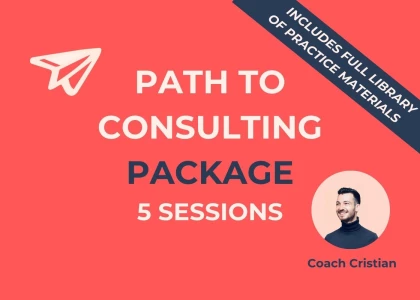These could include strategies which are generalizations, or rules-of-thumb, reduce cognitive load, and can be effective for making immediate judgments
What are some of your most favourite heuristics for solving business problems?


Hi there,
I'm a big fan of the idea that there are no shortcuts. Or at least that the best shortcuts one ends up using are ones that they discover on their own, that are specific to them.
Still, I get your point. From my point of view there are at least two major shortcuts:
1. Is trying to look at the typical frameworks of the 10 most common case types (market entry, new product, etc.), practice a few examples and have at least a basic understanding of what are the typical things to look for. From there you can then start adjusting these frameworks to reflect specifically your case (but please don't get too comfortable and start deploying the same framework all the time - that's a guaranteed fail in the interview).
2. Shifting your mindset. There are multiple points here that are critical for the interview, but one of them is that the interview is meant to replicate a conversation with a client. Don't see the interviewer as a gatekeeper, but as a partner and try to guide them through the solution, engage them, more so than trying to dump content on them.
I'm also sending you here an article you might find useful about what is the experience of being a starting consultant. It should help you understand what are the expectations from the role and how to best perform - https://www.preplounge.com/en/articles/entry-level-consultant-what-is-it-like
Best of luck!
Cristian

Hi there,
I think this is an interesting question that may be relevant for many people. I would be happy to share my thoughts on it:
- Using frameworks and using instances from prior cases are two of my favorite heuristics for resolving business issues.
- By emphasizing important questions to think about in a specific context, frameworks give you a foundation for approaching problems and assist in organizing your thoughts. This can be particularly helpful for lowering cognitive load and making snap decisions.
- Another useful tactic for resolving business issues is to use instances from prior cases as examples. Using examples from your own life will make it simpler for you to remember pertinent information and apply it to the current issue at hand. By doing this, you can make sure that you don't overlook crucial details and can make use of your prior experience moving forward.
- Overall, it is important to have strong business understanding and the ability to adapt based on the prompt in order to effectively solve business problems. Using a combination of frameworks and using instances from prior cases can be helpful in this process.
If you would like a more detailed discussion on how to address your specific situation, please don't hesitate to contact me directly.
Best,
Hagen

Hello!
The key is to have strong business understanding and be able to adapt based on the prompt.
To do this I recommend 2 tools:
1. Generic framework that you can find in books / online / etc. Those give you a basis to start and build from (e.g. what key questions to think about in which context)
2. Note example from previous cases. It is much easier to remember examples tied to an experience you had vs dry frameworks. That way you will remember what you got right and what you forgot and will leverage this knowledge going forward.
Cheers!

I suggest learning the 10 most common frameworks (e.g., M&A, profitability, cost-cutting, product launch, market entry, etc).
Rember that you have to be flexible and link frameworks to the specificities of the case.
This will give you the knowledge to run the first mile of a 20 miles run.
To go for the remaining part of the run, you have to learn to think from the first principles. You should be aware of the fact that everything starts with a good scoping of the current situation and the end goal. From that, you can ask yourself “what is needed to solve the problem?”.
With this question, you shift your mindset to finding the elements/drivers of the problems.

Well, these are part of why you'd hire me as a coach :)
Of course, my best strategies aren't for free (sorry).
One thing I will say is be careful with casebooks. They're great practice but generally their frameworks aren't great. Reading BCG/McKinsey insights will also help with your frameworking.
This reading should also help:
https://www.preplounge.com/en/articles/how-to-shift-your-mindset-to-ace-the-case
https://www.preplounge.com/en/articles/pitfalls-case-interview-preparation

For me it's having internalized the combination of hypothesizing in a MECE structure. Hypothesizing refers to making assumptions about what could be the case instead of just having an empty bucket in your framework that's waiting to be filled later. I guess MECE doesn't have to be explained but it's a bit like poker. You understand it in 5 minutes and need a lifetime to master it (or something like that…).
I started practicing this as an MBB candidate and it manifested itself very strongly later. As a McKinsey consultant, my brain was doing this automatically 24/7 (I even dreamt about it…) and to this date it serves me well.
When solving problems with my leadership team at my current job as a Strategy Lead, I'm always throwing around ideas (hypotheses) across the conceivable spectrum, which really gets the conversation going.
Curious to hear more from the others!

My advice would be to learn frameworks and then adapt them. The value would be to have a skeleton than you can recognise and tie back to a business problem. For example, in retail, PQRS (Price, Quality, Range and Service) can help you quickly Identify a skeleton of consumer-facing things that retailers can flex to compete and differentiate themselves. You can then spend more time actually thinking about what these mean for the client and which matter more.












